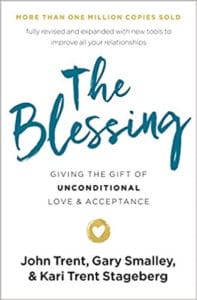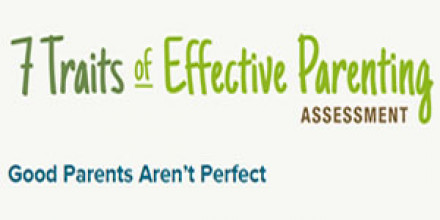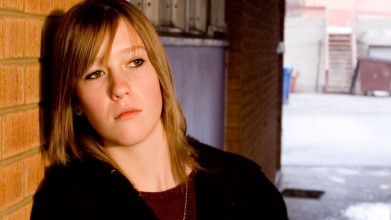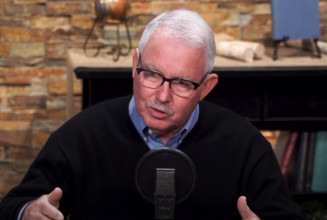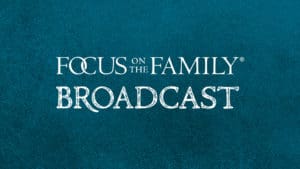Excerpt:
Mrs. Kari Trent Stageberg: And I remember sitting down with him and just kind of saying, “So I guess I can’t come back to the house. You guys don’t – you know, I guess you’re just done,” in essence. And he just put his hand on my shoulder and just said, “Kari, it’s not about where you’ve been, it’s about where you’re going.”
End of Excerpt
John Fuller: That’s Kari Trent Stageberg. And she’s our guest today on Focus on the Family, along with her dad, Dr. John Trent. And we welcome you to this episode. I’m John Fuller. Your host is Focus president Jim Daly. And today, we’re going to talk about the importance of living and giving a blessing to your children, your grandchildren and others in your sphere of influence.
Jim Daly: John, the impact of growing up in fragile families – let me call them that – um, sometimes fatherless homes – it’s really taken a toll on the culture over these past several decades.
John: Yeah. You can see it.
Jim: I mean, many people who have not experienced a blessing from their mom or their dad, and because of it, um, they don’t know how to bless their own children. Even this morning with, uh, reading the prep and reading the book, I, uh, was up early, about 6 a.m., with Troy. And I said, “Troy, do you remember that time” – I took him hiking and camping. I said, “And I did a blessing over you.” I wanted to make sure he caught it. And he said, “Oh, yeah, Dad. I remember it.” I thought for sure he would have forgotten it because he was probably 8-years-old.
John: Hmm.
Jim: Now he’s 17, but he – it meant something to him. And it is so important to instill and then reinforce with our children, uh, the messages of love, acceptance and value and identity in Christ, especially for those of us who are trying to raise our kids in a Christian context. And today, we have two wonderful guests who are going to talk about how to give that blessing to your children.
John: Mm hmm. And Dr. John Trent is very well known. He’s been here a number of times. He’s a speaker and bestselling author and is the president and founder of strongfamilies.com. And his daughter, Kari Trent Stageberg, also works as a writer and speaker, and, uh, she works with him at strongfamilies.com. And together, they have newly revised and expanded version of the classic book, which has sold more than a million copies, The Blessing: Giving the Gift of Unconditional Love and Acceptance. And of course, we have that at focusonthefamily.com/broadcast.
Jim: John and Kari, welcome back to Focus.
Dr. John Trent: Hey. Thank you.
Kari: Thanks.
John T.: Great to be with you.
Jim: You know, I – I’m looking at the cover of the book The Blessing. And, of course, it’s John Trent, Gary Smalley and now Kari.
John T.: Yeah.
Jim: You’re on there, too. Talk for a moment, if you, uh, would, about your relationship with Gary Smalley, because you two…
John T.: Yeah.
Kari: Yeah.
Jim: You’ve both had such a wonderful impact. And, uh, you know, I’m sure, like me, you miss him.
John T.: Oh, man.
Kari: Yeah.
John T.: I mean, you know, it’s been almost three years since we had Gary go home to be with the Lord. And, uh, we still get to talk to Norma. We still get to hug and hang out, you know, with Greg, his son. And – and yeah.
Jim: Yeah. Greg’s here, and we love that.
John T.: Yeah. And, um – but that was such an amazing time. I mean, when Gary and I first started – I mean, picture, it’s like, you know, two otters…
Jim: (Laughter).
John T.: …Uh, getting to work together. Uh, they’re…
Jim: Little bit of chaos?
John T.: …Best friends. Yeah. And thank the Lord, we had a guy named “Downtown” Terry Brown, you know? And Terry ran everything.
Jim: (Laughter).
John T.: He and Norma – so Gary and I would show up at conferences late, uh, usually. And, um, just…
Kari: Not much has changed.
(LAUGHTER)
John T.: No. Not much has changed, no. But it was really just an absolutely unbelievable time, including getting to write books like this, you know?
John T.: Yeah.
Jim: Yeah. And The Blessing, like John said – I mean, over a million sold.
Kari: Yeah.
Jim: You had a way, both of you, of really connecting with the audience.
John T.: Well, I mean, I don’t think anybody – I’d be working on a book if I was at a seminar, and he was speaking, you know? And so, I’d be back there. I couldn’t stay in the same room where Gary was speaking because even though I’d heard the stories a million times, I – it would just…
Jim: (Laughter).
John T.: …Hook you, you know? I had to literally go out of the sound of his voice to be able to get anything done.
Jim: He was a great storyteller.
Kari: Yeah.
John T.: Yeah.
Jim: I mean, that was really his thing. Okay. Let’s get into it. Uh, what are some of the key components to a blessing? Uh, you’ve outlined them in this great book. So, what are they?
John T.: Yeah. Well – and that hasn’t changed. I mean, one of the things with Kari coming on board with his book is it’s not that the core message has changed, you know? And you’re right. There’s five things. When you really think about the blessing and what in the world is it, you know? Well, um, every time a parent gave a blessing, when Jesus took those kids and put them in His arms and blessed them, every time a blessing was given, um, it did, for example, things like this. You attached high value to somebody. Are you guys familiar with attachment theory today?
John F.: Oh, yeah.
Jim: Oh, yeah.
John T.: And I’m telling you. You talk about – uh, right now, there’s been over 125 studies on how crucial attachment is. Well, the blessing is the Bible’s, really, guide to how do you get connected with people. And you sit there, and you start off and say, “Well, boy, I want to attach high value. I want to look at them in a way that they have a special future.” That’s the next one, you know? Um, “That I see something in your life, Kari, that you might not see right now.” You know, if they’re a junior-high kid and the whole world is wrong or – or they’re just in a – in a tough situation. But we get the chance to attach high value to help them say, “Uh, man, you’ve got a special future. You know, I can see it. Uh, I asked God to really help with that with you.” And then genuine commitment is the third thing that we looked at in that book, where you don’t just talk about it, but you, uh, hang in there.
Jim: Yeah.
Kari: Yeah.
John T.: I remember my mom – you know, I didn’t grow up in a Christian home. And, uh, I thank God for my mom, who gave me the blessing, even though – uh, you know, I could talk my twin brother into doing things.
John F.: (Laughter).
John T.: But then he got really smart and quit doing it, you know?
Jim: Right. Not only that, but she’s a single-parent mom.
John T.: A single-parent mom. Yeah.
Jim: I mean, your dad was out of the scene.
John T.: And I remember, you know, one time, it’s like 2 in the morning, and the cops bring me home. And, um, now back then they’d bring you home. Okay? Now, today they’d just haul you off.
John F.: Take you to juvie or – or, you know.
Kari: Yeah.
John T.: But – but – so, and then they wake up my mom and she’s a rheumatoid arthritic. And she comes down the hall, 2 in the morning and limps down the hall. And the cop’s yelling at us, and, you know, “We ought to take him in” and all that stuff. And I remember Jeff and I going in and sitting at the table. So, I go to my mom. I go, “Well, Mom, I guess this means you don’t love us anymore.” And I’m telling you, her head snapped up. She had these beautiful blue – kind of gunmetal blue eyes. And she goes, “This has nothing to do with love. I will always love you. But I am tremendously disappointed in you.”
Jim: Mm.
John T.: And so, I knew right then. OK, No. 1, I’m grounded again. OK, you know?
Jim: Right.
John T.: But I also knew I can get brought home at 2 in the morning, and at least I got one person that’s crazy about me.
Jim: Yeah.
John T.: You see what I’m getting at?
Jim: Yeah. You’re not going to lose that – unconditional.
John T.: Yeah. Yeah.
Kari: Right.
John T.: Unconditional, yeah.
Jim: But there are consequences to your actions.
John T.: Yeah. Exactly.
Jim: And in fact, we’re going to talk about that. And it’s interesting, uh, Kari – the audience may not have caught this yet, but you are John’s daughter.
John T.: Yeah.
Kari: Yes. Yes.
Jim: So, we’ve got the proof in the pudding here. I mean, hearing your dad when he was a younger fellow and hearing him go through all those kind of crazy things. Uh, you saw your mom and dad – before we get to that part of the story, though, your story.
Kari: Yeah.
Jim: You saw your mom and dad modeling this, giving you a blessing.
Kari: Oh, absolutely.
Jim: I mean, it sounded like almost every day somehow…
Kari: Yeah.
Jim: …They blessed you.
Kari: They did. You know, I mean, they would start us off in the morning with a song that they created. It didn’t really rhyme, but it, you know….
Jim: I am so appreciative of that.
Kari: …Was our blessing song.
John T.: (Laughter).
Kari: Yeah. You know, so….
Jim: I do that, too.
John F.: That’s kind of – that’s kind of the new thing these days.
Kari: The theme. Yeah. Exactly. More of a haiku, if you will.
Jim: Yeah.
Kari: Um, but you know, we started off the day with a blessing. I mean, there literally wasn’t a day where I didn’t hear that I was loved or valued, or that I had a God that was crazy about me, too.
Jim: Yeah, that is so good. In fact, you, uh, related to a special plate that somebody had given you.
Kari: Yeah.
Jim: Tell the story about the special plate.
Kari: Well, the special plate kind of came into play when, uh – when both my sister and I were born. We have a great friend of our family. And instead of, you know, baby clothes or something for that, she gave my parents a special plate for each of us. And, you know, it’s this cute red plate that just says, “You are special today.”
Jim: Made out of china.
Kari: Made out of china.
Jim: Yeah.
Kari: So, it’s special, you know? Yeah. It’s very breakable compared to other things you let – you used to let us eat off of – for good reason.
(LAUGHTER)
Kari: But, you know, we, uh – in our family, that kind of became a way of blessing each other. So, whether it was our first day of school or we had had a bad day or, you know, we finally finished that term paper, we got the special plate. And whoever had the special plate, everyone had to go around the table and give that person a blessing…
Jim: Oh, wow.
Kari: …And say one reason why they loved and appreciated them. So, it kind of just became a way to not only celebrate victories but encourage us when we were really struggling as well.
Jim: Yeah. That’s really a great idea. I had never thought of that one.
Kari: Yeah. And you could find them on Amazon. They’re, like, 15 bucks. So yeah.
(LAUGHTER)
Jim: There’s the pitch.
John T.: Yeah (laughter).
Jim: John, another way that you, uh, practiced blessing Kari and your other daughter was through storytelling.
John T.: Yeah.
Jim: You’re talking about that. You’re alluding to it. Can we get an example of it? (Laughter).
John T.: Well, or, you know, I actually – I may go back to Kari because, um, I do think there’s a sense in which kids, uh, really need to know, you know, with our touch, with our words, those are two other things that are part of, you know, the blessing…
Jim: Right.
John T.: …Is that appropriate touch. People are so freaked out today about touch.
Jim: Yeah.
John T.: And rightly so in a lot of ways. Uh, but, man, you know, that hand on their shoulder or that appropriate touch, um, and then saying words. You know, it’s interesting, but do you know how flowers bend toward the light?
Jim: Right.
John F.: Yeah. Yeah.
John T.: You know? Well, let me tell you, when you tell a kid…
Jim: Mm hmm.
John T.: …Or a spouse, you know, how valuable they are, it is amazing how – even today, you know, um, so many kids are so lonely. This is one of the most unparented generations because you just hand ’em an iPad and hope for the best, you know?
Jim: Right. They’re entertainment-parented…
John T.: Yes.
Jim: …If I could say it that way.
John T.: Yeah – and man, just to get ’em to put down the iPad for a second and say, “Hey, look at me.” My mom was so great at that. You know, she would always make me – you know, “Look at me.” In this day and age, you know, um, you know, Gen Z, the whole younger millennials, they’re multitaskers. So, they’re talking to you while they’re doing their homework, while they’re watching something. Uh, they’ve got a conversation going on with friends. And so, sometimes just slowing things down…
Jim: Yeah.
John T.: Um, but Kari – we used to – tell them about bungee bear.
Kari: Yeah.
John T.: That’s an example.
Kari: Yeah. Bungee bear’s my favorite.
Jim: Bungee bear storytelling.
Kari: Yeah.
John F.: All right. Here we go.
Kari: So, this all really started in the backyard. And to preface this, do not do this at home…
Jim: (Laughter).
Kari: …Without padding and helmets and supervision. But, uh…
Jim: (Laughter) Okay. This is going somewhere.
Kari: Yeah. So, what he did was – and mom was there, too.
Jim: (Laughter) Can’t believe it.
Kari: …Which is why we needed padding. But, you know, we took one of our favorite bears, and he attached a bungee cord to it. And then he had my sister and I walk as far away as we possibly could so, you know, the bungee cord’s really tight and then let go of the bear.
Jim: (Laughter).
Kari: And I mean, the velocity on that thing was just – I mean, you could…
Jim: Zoom. Bam!
Kari: …Knock someone out.
John T.: Knock you down. Yeah.
Kari: You know? So yes. Do it with safety. But really, what the heart of that was is he was – sat us down afterwards and just said, “You know, I want you to know that no matter how far you go, you know, whether it’s from us or from the Lord, you’re always attached to us, and we’re not going anywhere.” And then it kind of morphed into something that I love, which was every morning from kindergarten through junior high, my dad would drive my best friend Brynne and I to school in the mornings – when you were in town.
John T.: Yeah.
Kari: And he would always tell us a bungee bear story. And for whatever reason, bungee bear was always experiencing something that we were, you know, whether it was – we were having a hard time with friends or, you know, we were afraid of something or school was really challenging. And really, again, it was just that picture, you know, before we get out of the car he would just remind us, “Hey, you have parents that are crazy about you and a God that’s crazy about you, and we’re not going anywhere.”
Jim: Yeah, that is so, so good. And so many young people need to know that, right?
John F.: Yeah.
John T.: Yeah.
John F.: Yeah, and it requires a lot of intentionality. That’s why we’re doing this program.
Kari: It does.
John T.: Yeah.
John F.: I mean, we want to encourage parents – you can do this. You’ve got to step up and provide that child with the affirmation, the blessing that you’re talking about.
John T.: Yeah.
Kari: Right.
John F.: Uh, to our listeners, let me just say we have a real quick summary of The Blessing. We’ve got the book by our guests. And we also have a free parenting assessment you can take to kind of gauge where you’re at in the relationship with your child. All of that at focusonthefamily.com/broadcast.
Jim: Kari, you gave an example of what your dad was doing when you were elementary school and junior high. Did it change a little in high school?
Kari: Yeah.
Jim: I mean, you’re a little more sophisticated in high school. You’re beginning to become more independent.
Kari: Yeah.
Jim: How did your dad try to continue?
Kari: Yeah, you know, and this one – I’m – like, always makes me cry but, um – and he still does this – but, you know, it did really start in high school, because you know, your schedule changes. You start driving. You’re not home as much. All of those things kind of morph. And so what he would do is no matter what was going on, whether – I was a cheerleader, so whether it was a late Friday night football game, or you know, out with friends, whatever it was, he’d be waiting up for me when I got home. And he’d always have my favorite snack, apples and peanut butter.
Jim: (Laughter).
Kari: And we’d sit at the table and he’d just asked me questions about my night.
Jim: Yeah.
Kari: And, you know, sometimes I’d go into it and I would almost kind of dread it because you’re going, “I don’t want to talk about what happened tonight.” Like the time I didn’t get asked to prom. But every single time I went to bed knowing, “Wow,” like, that was so incredibly helpful, not only to process it, but to know that, you know, my dad loved me enough to wait up to have apples and peanut butter with me.
Jim: What I want to dig into now, though, is a little bit more of your story, Kari because, um, people are hearing this, some parents are going, “Isn’t that nice that John Trent and his daughter had such a wonderful relationship, and he blessed her every day and stayed up late at night…”
John T.: And Mom, too, yeah. Cindy, too, yeah.
Kari: Yeah.
Jim: Right, and it is good. I’m not – I’m not trying to signal any kind of, you know, negativity in that way. But you struggled when you went to college and you had some valleys, I would say…
Kari: Yeah. Yeah. Absolutely.
Jim: And – and I think the reason I want to go here is because there’s so many listening, parents of prodigals, that they did all the things, maybe different things that your mom and dad did.
Kari: Yeah.
Jim: And, um, their kids aren’t there with the Lord. And they’re in their 20s. And they’re frantic. The parents are going, “What do we do? We thought we did everything right…”
Kari: Yeah.
Jim: “…According to the formula of how to raise children.” Speak to that dark challenge in your life and what happened.
Kari: Yeah. Well, and I think, you know, the blessing isn’t a formula, you know? And there just isn’t a formula…
Jim: Right.
Kari: …Whether it’s faith, relationships, the – there’s no formula. And while I did hear every day that I had value and a God that was crazy about me, the Lord felt really abstract. You know, I was watching other people interact with Him and I just couldn’t figure out, well, how does that even apply to me? And as you can tell from the practicals, I’m a very practical person. And I wanted to see it. And I just couldn’t. And so, that led me on a journey of trying to find value outside of the Lord and my family, which really led, um – I mean, probably almost 15 years of just I don’t know about this thing. And it wasn’t that I ever didn’t believe that God was real. I just didn’t think it applied. And so, long story short, I ended up eloping, shocking my whole family. Not the best thing to do when you have a dad in marriage and family ministry. Um, and I ended up in an abusive relationship.
Jim: Yeah.
Kari: And it was really through that that I realized that God was real. And He rescued me out in an incredibly miraculous way of literally showing up when I called out for Him and real – not to stay too long on that, and it’s in the book, and you can read more about it. But, one night, he got really violent, and he left. And normally, you know, he’d go in the other room and play video games, and it was kind of like nothing ever happened. But that particular evening, he left. And I just remember crying out and saying, “God, if you’re real, just get me out.” And without exaggeration, 10 minutes later, there was a knock on the door, and someone had a safe place for me to go stay.
Jim: Wow.
Kari: And, you know, I didn’t – that wasn’t the end.
Jim: Sure.
Kari: You know, there was still a process of having to go through that. But that was the moment where I realized, maybe God is listening.
Jim: Yeah.
Kari: Maybe He does care about me personally. But, um, you know, in terms of kids that have walked away, I mean, you and mom went through a lot. I put you through a lot. And then even when I got out, you know, I’ll never forget you found out, um, not through me but through somebody else, a whole slew of things that I had just done that were incredibly heartbreaking. And I remember sitting down with him and just kind of saying, “So, I guess I don’t – I can’t come back to the house. You guys don’t – you know, I guess you’re just done,” in essence. And he just put his hand on my shoulder and just said, “Kari, it’s not about where you’ve been, it’s about where you’re going.” And you gave me your blessing and told me that God wasn’t done with me, that you and mom weren’t done. And that doesn’t mean that they didn’t have boundaries. That didn’t mean that it didn’t take time to restore that trust in that relationship, because it did. But that really unleashed me to be able to say, “You know what, maybe there is hope for me here.”
Jim: Yeah.
Kari: Especially in that broken place coming out of abuse.
Jim: And it’s, you know, it’s so beautiful. And I appreciate you sharing…
John F.: Mm hmm. Yeah.
Jim: …The pain in your life. But you know, what – it brings me to tears thinking about it, is how we try to hide that. And it’s exactly what the Lord wants to lift up…
Kari: Yeah. Yup.
Jim: …Because that’s where He shines, right? It’s not when we’re doing so well and we’re projecting something perfect. It’s when we’re broken.
Kari: Yeah.
Jim: And I love that Scripture, and people hear me say it a lot. You know, “He’s close to the brokenhearted… “
Kari: Absolutely.
Jim: “…And saves those crushed in spirit” And let’s run to it then, right? And that was your crushing-of-spirit moment.
Kari: Yeah.
John F.: Mm.
Jim: But John, let me turn to you, because a mom and dad listening right now, maybe their daughter or their son is still in the valley.
John T.: Yeah.
Jim: And they did all these things. They listened to Focus on the Family. They heard Dr. Dobson say, “Dare to discipline,” (laughter).
John T.: Yeah.
Jim: They heard you and Gary talking about great parenting approaches, Biblical parenting. They applied it.
John T.: Yeah.
Jim: But my 26-year-old is not with the Lord now. And we don’t have a great relationship. And I can’t even imagine picking up the phone and saying, “Can I say a blessing over you now?” It won’t work. There’s too much pain. What do you do?
John T.: Well, you know, No. 1 is, uh, I am so grateful that I did have a model of a mom that whether you’re picked up by the police, or you’re just doing other things that are just way out there, um, man, she never gave up on me. And then I also really believe – and I think this is huge, you know – is you know how in Hebrews, uh, you know, for he himself who said – Hebrews 13:5 – I will – you know, Jesus says, “I will never leave you nor forsake you.” Well, you know, I think, you know, that’s exactly – even when Kari was at the – you know because we lost her. I can’t even explain to you how tough that is. I mean, parents know that or in that situation. But, you know, she’d move around. They would – you know, you try to call. You were always doing stuff on the phone. She wouldn’t even do, you know, the FaceTime stuff because then you might see something. And you just knew they were hurting. And – and of course…
Kari: And I can’t even look you in the eye. I mean, I’ll never forget that moment where after I started healing where he just said, “This is the first time you’ve looked me in the eye in three years.”
Jim: That’s how deep it was.
Kari: Yeah, it was.
Jim: Wow.
John T.: Yeah, so I think, you know, man, once you get Jesus’s love in your life, and it’s so hard to do, but, man, He would look at a Levi and see Matthew, you know? He’d look at a Saul and see Paul. And so, the thing that I kept feeling with Kari and praying about was, Okay. Kari has a special future, you know? So, I never gave up on – on her and neither did Cindy, you know…
Jim: So, you – you remained hopeful. That’s what I’m hearing.
John T.: Yes, but that doesn’t mean then that we, you know, we didn’t subsidize the behavior. We didn’t do all that. But, man, I’m telling you, it was just really tough.
Jim: Yeah.
John T.: And you had a line up almost every day like that little widow woman and go, “Okay. I’m going to just keep praying and someday she’s going to change.” And God, you know, miraculously in our case. But, you know, you don’t give up.
Jim: Yeah.
John T.: You say, “Lord, I’m going to still trust You.”
Jim: Yeah, Kari, let me ask you in, you know, the final couple of minutes here. Could you speak to parents?
Kari: Yeah. Yeah.
Jim: I mean, you went through that. And just speak directly to those parents who are struggling.
Kari: Yeah.
Jim: What would you say to them?
Kari: You know, I think there’s really two things. I mean, the first is that you have to have grace for yourself and realize that this is – you know, I think for me, especially, I didn’t realize until after how much I had hurt people. It wasn’t about them. And I wasn’t doing it to hurt them. I was caught up in my own hurt. And I think when – sometimes when someone is so broken, they don’t realize that impact. So, I think have grace for yourself. Know that it’s not your fault and that your kid is – what they’re doing that’s hurtful, it may not be intentional. Um, and I think the second part of that really is just that God will never stop pursuing them.
Jim: Yeah.
Kari: And He never quit with me. He’s not going to quit with your kid.
Jim: Let me ask you, too, about the guilt…
Kari: Mm hmm.
Jim: …Because I think one of the things parents go through, it’s this constant guilt that “What did I do wrong?”
Kari: Yeah.
Jim: Where did I miss it?”
John F.: “What else could I have done?”
Jim: And they, you know, frankly, in the marriage they might be pointing at each other…
Kari: Right.
Jim: …The parents. Can you speak to that to the parent about, you know, your behavior was not your mom and dad’s behavior?
Kari: Right. Right.
Jim: And were you able to separate that?
Kari: Not until later. You know, at the time – and again, especially, I think, too, with abuse it was such a unique situation where you – when you’re in that, you really can only focus on that situation. Um, you know, I mean, and you might be able to talk a little bit more about what you and mom went through, um ’cause even when I came back, they never rehashed that with me. We’ve had some conversations about it over the years. But yeah…
Jim: I think it was, like, probably a sigh. “Whew. Okay.” (Laughter).
John T.: Yeah.
Kari: Yeah, but I know – I know for you and mom you really struggled. But it – and you guys went to counseling and got help to really kind of realize this isn’t – you are not responsible for the decisions of others.
Jim: Yeah. Yes.
John T.: Yeah.
Kari: Whether it’s your kid or not, you are not responsible for their decisions. That is their choice, as hard as that is to accept.
John T.: Yeah, and just, you know, again, uh, I pray right now for every parent that is feeling like they’re in a bad dream, you know?
Jim: Yeah.
John T.: And just – it’s really hard to believe someday we’re ever going to walk out of this. And in some cases, kids don’t come back. You know, we’re so grateful, I mean, with – for – to have Kari. And you had to rebuild your relationship with your sister, with your, you know…
Kari: Everybody.
John T.: …With mom, you know…
Kari: Friends.
John T.: I hope people don’t hear this was like, well, um, there was no…
Kari: Magic moment.
John T.: …No magic. Yeah. But – but I cannot even tell you how much that whole concept of the blessing helped, because you – have you guys seen the new Mr. Rogers movie?
Jim: I haven’t seen it yet.
John T.: OK, you got to go see it, you know. But, um, it’s really the picture of a guy that’s really broken with a dad that left. And then he’s an investigative reporter, and he’s going to show Mr. Rogers as, you know, being…
Jim: As a fraud.
John T.: …Yeah. As a fraud. And it changes his life. Just the reality of love and acceptance. And there’s an amazing study – this guy named Prophet, and he, uh, does basically, visual perception studies. So, here’s what he would do, is he would take somebody and put them right next to you right at the base of a really high hill, really high hill. Okay? And you’ve got – you’re all hooked up, and they’re measuring everything. And now guess what they would do. Okay? Is they’d bring somebody over that you were closely connected with. So, if it was a spouse, they’d hold your hand. If it was a kid, they’d have you put your hand on their shoulder. Okay? And now they measured what was going on. And they’re going to climb that hill with you, that really high hill. And it is unbelievable what happens. Now, you’re still climbing a really high hill. But when you’re doing it alone, it’s like Mount Everest. But when you’ve got somebody with you…
Jim: Huh. That’s interesting.
John T.: …And that’s what we’re trying to say…
Jim: Yeah.
John T.: …Is, man, you know what? Bless that kid.
Kari: Yeah.
John T.: They may be facing this giant hill, but you’re saying, “We’re doing this with you.”
John F.: Hmm.
John T.: And it’s amazing how – how that can really impact a family.
Kari: Well, and I – and I will say this, too, I mean, you did. And I wasn’t accepting any of what they were giving. But it mattered. And I’ll never forget there was one time – one of the few times that we kind of were face-to-face during that season – and he wrote me a list of truths about myself that God said about him and that him and my mom believed. And him and my mom both signed it. And I still have it in my wallet.
Jim: Wow.
Kari: And, you know, in that moment, you might not be ready to receive it. But those truths matter. So even if your kid’s really struggling and if you’re not communicating, write it down for yourself…
Jim: Yeah. Yeah.
Kari: …Because maybe someday you can give that to them.
Jim: That’s a great statement.
Kari: Um, and that, I mean, that was – you still spoke truth about what you saw.
Jim: Well, listen, we have got to wrap up, unfortunately. But, um, let’s go to the website. I want to talk a bit more about how you do the blessing. And so, for the listeners, for those on YouTube, you can go to the website, and we’ll continue the conversation for a little bit more. But thank you so much for being with us. Thank you for this powerful instruction on how to provide a blessing to your child. And, uh, Kari, thank you for being…
Kari: Yeah, thanks for having me.
Jim: …I know, but for being the example of how it can work, even with the valleys. You know, if it works to God’s plan, there’ll be joy and peace and hope in all of it. So, thank you both for being with us.
John T.: Can I pray quick blessing over her? Lord, I just do thank you for Kari and her sister and her mom and the journey and pray for each person that’s maybe going through something similar. So, thank you for having a special future for us. And – and Lord, for – we just do attach great value on her and pray a blessing on her. Amen.
John F.: Amen.
Kari: Amen.
John F.: Well, thanks to John and Kari for joining us today for Focus on the Family. And, uh, I had mentioned some resources earlier, including their great book The Blessing: Giving the Gift of Unconditional Love and Acceptance. You’ll find that, that free parenting assessment I mentioned and the extra conversation that we’ll continue with here in a moment. Our contact info is 800-A-Family. That’s our phone number, 800, the letter A and the word FAMILY. And online you can find these resources and make a donation if you can at focusonthefamily.com/broadcast.
Jim: And, John, let me say that when people make that donation, we’ll say thank you by sending a copy of The Blessing to them. Your gifts are so important to helping Focus continue this very important work of strengthening family relationships. We’re hearing from moms and dads every day who tell us we’re a lifeline or a life-saver for their family. And that’s very humbling. It’s God who is doing the work and He uses you to be part of it. Get in on the summer matching gift opportunity. Some generous friends of Focus are going to double your contribution when you call today, so $25 becomes 50 and so on. So, please, help us help others today. Let’s do this together and, again, we’ll say thank you by sending a copy of The Blessing.
John F.: You can do that online at focusonthefamily.com/broadcast. Or when you call 800, the letter A and the word FAMILY. On behalf of Jim Daly and the entire team, thanks for joining us today for Focus on the Family. I’m John Fuller inviting you back as we once again help you and your family thrive in Christ.










